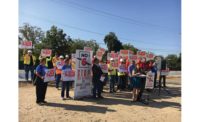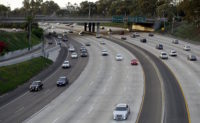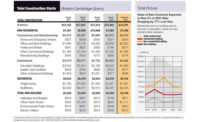Story had input from Debra K. Rubin, Jim Parsons and Mark Shaw
California voters opted against the high-profile Proposition 6 ballot measure, that if passed, would have repealed a 2017 gas tax increase earmarked to fund about $5 billion a year of state road and rail projects. Industry groups, companies and unions had pushed hard against the measure championed by state anti-tax proponents.
"By defeating Prop 6, California voters sent a message that they will support accountable transportation funding as well as our economy by protecting over 68,000 jobs across the state," said Michael Quigley, an official of the No on Prop 6 campaign.
"That’s a message the Trump administration and new Congress should heed as they consider a bipartisan infrastructure package and permanent revenue solution for Highway Trust Fund programs next year," said William Toohey, acting CEO of the American Road and Transportation Builders Association.
D.A.Davidson construction sector analyst Brent Thielman says the measure's defeat removes market uncertainty for some publicly held firms such as Granite Construction and Vulcan Materials. California is Vulcan's largest single market, and before it diversified into the water sector with the purchase of Layne Christensen, Granite gained up to 28% of total revenue in the state, he adds. Thielman says the value of state DOT bid lettings are up 84% year to year.
But voters failed to support a separate measure for a $9-billion bond issue for major water projects, with 54% saying no, the first rejection of a water infrastructure measure in 30 years, says the Sacramento Bee. Opponents said the proposal lacked accountability for spending the borrowed money, which would have to be paid back from the state’s general fund, according to local media reports.
Connecticut voters OK'd a transportation fund lockbox, but in other states, finance measures failed to win support—including two different initiatives in Colorado totaling more than $9 billion that were both defeated by at least 60% of voters—as well as a gas-tax increase in Missouri.
In Colorado, voters soundly rejected two competing transportation initiatives. Proposition 109, would have allowed the state to seek $3.5 billion in bonds for targeted highway-and-bridge projects, without raising taxes. Proposition 110 sought a modest statewide sales tax to fund nearly $6 billion for a variety of transportation projects, including transit and multi-modal improvements.
The failure of the Colorado measures could lead lawmakers to ask voters on 2019 election ballots to approve $2.3 billion in bonds for transportation projects, says The Denver Post.
Transportation measures fared better on the local level, including sales tax increases in Broward and Hillsborough counties in Florida, Beaufort County, S.C., and Marin County, Calif.
A $740-million bond issue was approved in Collin County, Texas, and smaller ones in Mecklinberg County, N.C. and Philadelphia.
Among much-watched measures in the energy sector, Washington state voters again said no to a proposed carbon tax on fossil-fuel emissions as they did two years ago, with about 56% rejecting it as of press time on Wednesday. The battle for and against the measure was the most expensive in state history.
Arizona voters rejected a measure that would have mandated utilities to obtain 50% of their electricity from renewable energy sources by 2030, an initiative that Arizona Public Service Co. and other opponents spent heavily to defeat.
But a similar proposal in Nevada passed, with 60% of voters approving a requirement to have 50% of state power from clean energy sources by 2030. Nevadans also rejected energy market deregulation in the state, allowing NV Energy to continue its monopoly there.
Among school infrastructure funding measure on this year's ballots, Wake County, N.C. voters approved nearly $900 million for public school and community college construction while New Jerseyans said yes to $500 million to fund new facilities and drinking water improvements in vocational education facilities and Rhode Island will be allowed to borrow $250 million for school upgrades.
Also, Miami Beach voters approved lease of public land for a $362-million, privately-funded convention center hotel and a separate $439-million bond for safety and infrastructure upgrades. According to local reports, those for and against the hotel spent more than $1.3 million in their campaigns.





Post a comment to this article
Report Abusive Comment